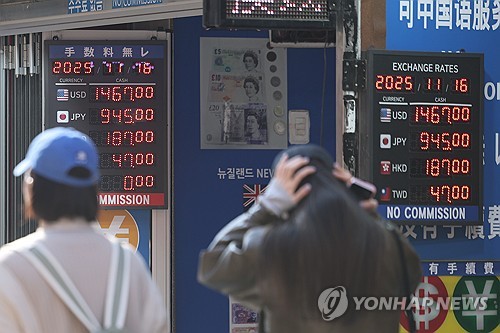(Seoul=Yonhap Infomax) As the dollar-won exchange rate approaches the 1,500 won mark, market anxiety intensifies, fueled by lingering memories of past crises such as the 2008 global financial meltdown and the 1997 Asian financial crisis.
However, the post-pandemic landscape for the won has fundamentally shifted. South Korea’s net foreign assets (NFA) surpassed $1 trillion at the end of last year, and outbound investments by pension funds, insurers, corporates, and households have structurally increased. With capital flows now persistently outbound, a higher exchange rate has become a new normal for the Korean market.
This means that the exchange rate figure alone is no longer a definitive indicator of crisis.
Still, the 1,500 won level is far from trivial. Elevated exchange rates impose structural burdens that accumulate across the economy.
The most immediate impact is on import prices. South Korea relies heavily on imports of energy, raw materials, and food, with most transactions settled in dollars. A stronger dollar instantly drives up import prices, which in turn feed directly into producer prices. As production costs rise, these are gradually passed on to wholesale, retail, and ultimately consumer prices.
According to Bank of Korea analysis, a 100-won increase in the dollar-won rate can add approximately 0.15–0.2 percentage points to consumer price inflation. Prolonged periods of a strong dollar threaten the path to price stability. In October, import prices in won terms rose 1.9% from the previous month due to the exchange rate effect, marking the highest increase in nine months.
Corporate burdens are also mounting.
While exporters once benefited from a weaker won, the rising share of imported raw and intermediate goods has eroded these gains. Import-dependent sectors such as refining, airlines, steel, and food are now bearing the brunt of the strong dollar.
Many companies had planned their annual management strategies on the expectation that the dollar-won rate would decline by year-end, but these forecasts have been upended, forcing firms to navigate both an uncertain business environment and exchange rate shocks.
The strong dollar also constrains monetary policy. Even if inflation stabilizes, the Bank of Korea faces difficulty cutting rates if the exchange rate remains volatile and elevated. Easing policy under these conditions could stoke inflation expectations, given the upward pressure on import prices.
In October, the central bank cited not only the real estate market in the Seoul metropolitan area but also the high exchange rate as a key financial stability factor in its decision to hold rates steady. Persistently high exchange rates narrow the central bank’s policy options, making the side effects of a strong dollar particularly acute.
While net foreign financial assets exceeding $1 trillion underscore South Korea’s external soundness, they also contribute to chronic won weakness.
The Bank of Korea has also noted that as residents’ overseas investments shift the composition of net foreign assets from banks and public institutions to the private sector, the ability to respond quickly to short-term FX market volatility may be diminished.
High exchange rate volatility and asset price swings can undermine the appeal of won-denominated assets, triggering a vicious cycle of declining domestic asset returns.
If supply-demand imbalances are resolved, the dollar-won rate could fall back to the low 1,400s or even the 1,300s. However, if large-scale overseas investment and weak domestic asset returns persist, the exchange rate is likely to remain elevated.
While 1,500 won per dollar may not in itself signal a crisis, it is certainly not a figure to be taken lightly. A persistently high exchange rate accumulates burdens across the economy, corporate sector, policy, and capital markets, and these burdens can eventually make the exchange rate itself a new constraint. Understanding the structural costs of a 1,500 won exchange rate is essential for an effective response. (Economics Department, Seon Mi Jeong)
*

smjeong@yna.co.kr
(End)
Copyright © Yonhap Infomax Unauthorized reproduction and redistribution prohibited.

